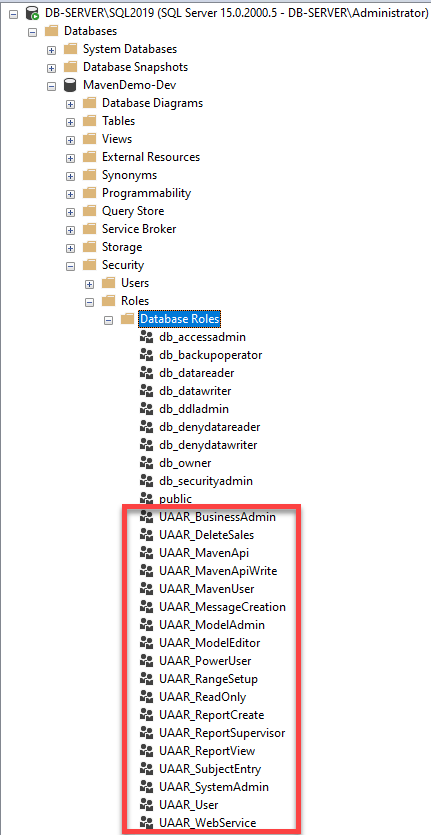Database Security & Database Roles
![]()
The UAAR Enterprise DataLog controls access to the database through SQL Database Roles. Six roles control which tables, views, and stored procedures a specific user can access. The SQL “public” role is not granted any permissions in the UAAR Database.
Database roles can be assigned directly to Windows Domain Accounts or Domain Groups to provide integrated security. Although it is possible to access the Enterprise database through SQL Accounts, it is not recommended.
All of the Database roles can be assigned in the UAAR DataLog directly. However, these roles can also be assigned directly in the database using Enterprise Manager or SQL.

DataLog Roles:
UAAR_BusinessAdmin
These users have access to set up Rule Sets and the Sale Index. As part of that setup, they can control the Server Responses. This includes marking responses as approved and merging responses to clean up sale data. The UAAR_BusinessAdmin role is also required to delete sales from the Enterprise database.
UAAR_DeleteSales
This access is intended for the user who is not a BusinessAdmin user, but who needs to be able to delete sales.
UAAR_MessageCreation
Not Used
UAAR_PowerUser
This user has all of the same rights as the UAAR_User. In addition, the Power User has read access to additional supporting tables and views. This access is intended for users who need direct access to the database for ad hoc reporting.
UAAR_Range Setup
The user can setup and Maintain Range of Values in DataLog
UAAR_ReadOnly
This user has access to search for and view sales in the database but cannot execute the stored procedures that insert or update sales data.
UAAR_SystemAdmin
This user has access to set up Database Roles and Access Groups. In order to set up Database Roles for new users, a SQL database user may need to be added. To accomplish this the UAAR_SystemAdmin role is granted the system role of db_securityadmin. If a domain account or group is given access to a database role and that user is not a user in the database, the system stored procedure sp_grantDBaccess is executed to grant that user access.
UAAR_User
This user has access to search for and view sales and insert or update sales. In order to insert or update sales, users must also have permissions to a specific Access Group.
There are additional UAAR role used for AgWare Maven. If you are not using Maven these can be ignored.
Maven Roles:
UAAR_MavenApi [Applies to Maven]
Used for third parties to access the read only API functions.
UAAR_MavenApiWrite [Applies to Maven]
Used for third parties to access the read only API functions.
UAAR_MavenUser [Applies to Maven]
This role is needed to log into the Maven website. It does not grant any access beyond logging in. In order to see any data or do any work users will need additional roles.
UAAR_ModelAdmin [Applies to Maven]
User can create, edit and approve models. This includes everything under the top level “Setup” item
UAAR_ModelEditor [Applies to Maven]
User can edit existing models.
UAAR_PowerUser [Applies to None - intended for third party reporting]
This user has all of the same rights as the UAAR_User. In addition, the Power User has read access to additional supporting tables and views. This access is intended for users who need direct access to the database for ad hoc reporting.
UAAR_ReportCreate [Applies to Maven]
User can create a new appraisal or evaluation. This user automatically has the UAAR_SubjectEntry permissions as well.
UAAR_ReportSupervisor [Applies to Maven]
Allows the user to apply a second signature to complete reports started by trainees.
UAAR_ReportView [Applies to Maven]
User can search for and view appraisal reports or evaluations saved in the system.
UAAR_SubjectEntry [Applies to Maven]
Allows the user to enter new subject properties
--------
UAAR_WebService [Applies to Maven]
This role should not be assigned to end users. It should be used by the service account connecting to the database from the Web Application.
